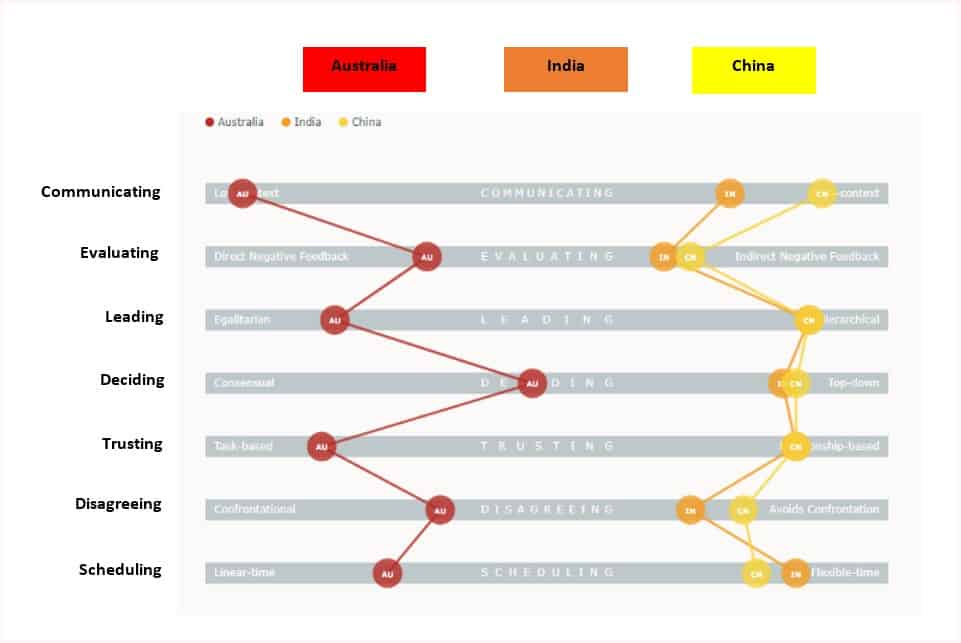
In today’s virtual world, what risks might you face and how might you leverage an asset, likely latent, but ready for action, in your team or organisation?
The facts of the matter:
- Cultural diversity is a catalyst for innovation, business growth and performance. (BCG)
- Diversity of Thought is critical for solving complex and interconnected challenges. (S. Page)
- InterCultural Maps Maps (Hofstede & Meyer) demonstrate differences (diversity) across countries and cultures.
- Differences which commonly exist in Australian teams, can be leveraged for greater impact and outcomes.

Symmetra’s Inclusive Leadership Index confirms leaders have top quartile strengths in treating others as individuals and taking action to support fairness in common corporate practices such as recruitment, promotion and pay. This doesn’t explain our lack of cultural diversity in leadership, however.

However, the 3 lowest rated items for Unconscious Bias, which include 2 of the lowest rated items in the whole Index, might explain the gap.
Leaders find it more challenging to get to know, or surround themselves with those who are not similar or like-minded. They also find it challenging to test their own assumptions or acknowledge their own decisions may be impacted by preconceived ideas.
Now, we might be getting to the heart of why Cultural Diversity in Leadership is not yet reflective of the cultural diversity in our society.
Leaders naturally shy away from difference and tension, ambiguity, dissonance and discomfort
Why hasn’t Unconscious Bias Training Successfully Generated more Culturally Diverse Leadership?
Unconscious Bias training has been deployed widely to assist leaders and teams to become aware of their differences.
But unless it has been combined with training on how to counteract biases in decision making, little difference in outcomes and impact is experienced.
Awareness without Action, doesn’t improve Performance.
Which Conscious Decision Making Approaches make the Greatest Difference?
At Symmetra we value research and data and here’s what it tells us:
- Leveraging Diversity of Thought generates greater innovation and performance (S. Page)
- Decision making which focuses on a robust process of reflection, is 6x more powerful than the analysis or data incorporated in the decision. (McKinsey)
- Teams with equal, engaged and “energetic” communication consistently achieve better performance. (Pentland)
- Productive tension in decision making is critical for more holistic and effective decisions (Hill)
Take a moment to reflect…
- To what extent do your current team processes consciously embrace the 4 approaches above?
- How might they be impacted by the current virtual environment?
The loudest, most confident voices in teams are commonly heard, often reflecting the leader’s viewpoints.
This effect is magnified in the virtual environment, particularly if you record team meetings.
How can we “Hard Code” Diversity of Thought into our Decision Making?
Given leaders have a preference for action and documented processes, we recommend providing them with just that.
Developing Team Communication and Decision Making Charters, or using de-biasing techniques such as Pre-Mortems, Vanishing Options and appointing Devil’s Advocates, are a few of the many ways to leverage difference and generate productive tension.
In today’s virtual world, “hard coding” conscious decision making techniques, will be more important than ever.
Ensuring the dominant and loudest team members don’t drown out all the latent knowledge, intelligence and value sitting in your team, will be critical to future performance.
When we drown out diverse voices in our teams we increase group think and perpetuate leadership homogeneity.
May 21, 2020, is a time to reflect, renew and reinvent – it’s a time to leverage and unleash Cultural Diversity and all of the very tangible business benefits it brings.
Let’s not leave Cultural Diversity to chance.
“Hard code” what will make a meaningful difference to future business and future generations.
